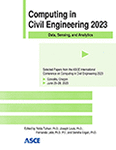Trust in Human-AI Interaction: Review of Empirical Research on Trust in AI-Powered Smart Home Ecosystems
Publication: Computing in Civil Engineering 2023
ABSTRACT
The growing socio-technical influence of artificial intelligence (AI) is increasing in various dimensions of our daily lives. The monitoring and decision-making role of smart home AI agents could go beyond simple operations, and a lack of users’ trust could lead to the underuse or misuse of their capabilities. As such, lying at the intersection of trust in human-AI interactions and smart home ecosystems, this paper attempts to explore the driving factors of building trustworthy AI-powered smart home ecosystems. To this end, through a systematic literature review, we have identified the characteristics of human-AI trust in intelligent environments, factors that can influence users’ trust in AI, features that can be implemented to improve users’ trust, and challenges and opportunities that need to be considered. The findings can help develop a pathway for building long-term users’ trust in AI-powered smart homes for integrated human-AI interactions.
Get full access to this article
View all available purchase options and get full access to this chapter.
REFERENCES
Cannizzaro, S., Procter, R., Ma, S., and Maple, C. (2020). “Trust in the smart home: Findings from a nationally representative survey in the UK.” Plos one, 15(5), e0231615.
Cuadra, A., Li, S., Lee, H., Cho, J., and Ju, W. (2021). “My bad! repairing intelligent voice assistant errors improves interaction.” Proceedings of the ACM on Human-Computer Interaction, 5(CSCW1), 1–24.
Emaminejad, N., Maria North, A., and Akhavian, R. (2021). “Trust in AI and Implications for AEC Research: A Literature Analysis.” Computing in Civil Engineering 2021, 295–303.
Glikson, E., and Woolley, A. W. (2020). “Human trust in artificial intelligence: Review of empirical research.” Academy of Management Annals, 14(2), 627–660.
He, T., and Jazizadeh, F. “Nudging Occupants for Energy-Saving through Voice-Based Proactive Virtual Assistants.” Proc., Construction Research Congress 2022, 402–411.
He, T., Jazizadeh, F., and Arpan, L. (2022). “AI-powered virtual assistants nudging occupants for energy saving: proactive smart speakers for HVAC control.” Building Research & Information, 50(4), 394–409.
Hubert, M., Blut, M., Brock, C., Zhang, R. W., Koch, V., and Riedl, R. (2019). “The influence of acceptance and adoption drivers on smart home usage.” European journal of marketing, 53(6), 1073–1098.
Jacovi, A., Marasović, A., Miller, T., and Goldberg, Y. “Formalizing trust in artificial intelligence: Prerequisites, causes and goals of human trust in AI.” Proc., Proceedings of the 2021 ACM conference on fairness, accountability, and transparency, 624–635.
Jin, H., Guo, B., Roychoudhury, R., Yao, Y., Kumar, S., Agarwal, Y., and Hong, J. I. “Exploring the needs of users for supporting privacy-protective behaviors in smart homes.” Proc., Proceedings of the 2022 CHI Conference on Human Factors in Computing Systems, 1–19.
Liao, S., Wilson, C., Cheng, L., Hu, H., and Deng, H. “Measuring the effectiveness of privacy policies for voice assistant applications.” Proc., Annual Computer Security Applications Conference, 856–869.
Liu, Y., Gan, Y., Song, Y., and Liu, J. (2021). “What influences the perceived trust of a voice-enabled smart home system: An empirical study.” Sensors, 21(6), 2037.
Lockey, S., Gillespie, N., Holm, D., and Someh, I. A. (2021). A review of trust in artificial intelligence: Challenges, vulnerabilities and future directions.
Page, M. J., McKenzie, J. E., Bossuyt, P. M., Boutron, I., Hoffmann, T. C., Mulrow, C. D., Shamseer, L., Tetzlaff, J. M., Akl, E. A., and Brennan, S. E. (2021). “The PRISMA 2020 statement: an updated guideline for reporting systematic reviews.” International journal of surgery, 88, 105906.
Rheu, M., Shin, J. Y., Peng, W., and Huh-Yoo, J. (2021). “Systematic review: Trust-building factors and implications for conversational agent design.” International Journal of Human–Computer Interaction, 37(1), 81–96.
Ryan, M. (2020). “In AI we trust: ethics, artificial intelligence, and reliability.” Science and Engineering Ethics, 26(5), 2749–2767.
Seaborn, K., Miyake, N. P., Pennefather, P., and Otake-Matsuura, M. (2021). “Voice in human–agent interaction: a survey.” ACM Computing Surveys (CSUR), 54(4), 1–43.
Seymour, W., Zhan, X., Cote, M., and Such, J. (2022). “A Systematic Review of Ethical Concerns with Voice Assistants.”.
Sharif, K., and Tenbergen, B. (2020). “Smart home voice assistants: a literature survey of user privacy and security vulnerabilities.” Complex Systems Informatics and Modeling Quarterly(24), 15–30.
Siau, K., and Wang, W. (2018). “Building trust in artificial intelligence, machine learning, and robotics.” Cutter business technology journal, 31(2), 47–53.
Ueno, T., Sawa, Y., Kim, Y., Urakami, J., Oura, H., and Seaborn, K. “Trust in human-ai interaction: Scoping out models, measures, and methods.” Proc., CHI Conference on Human Factors in Computing Systems Extended Abstracts, 1–7.
Wang, T., Zhang, K., Chen, W., Dou, W., Zhu, J., Wei, J., and Huang, T. “Understanding device integration bugs in smart home system.” Proc., Proceedings of the 31st ACM SIGSOFT International Symposium on Software Testing and Analysis, 429–441.
Information & Authors
Information
Published In
History
Published online: Jan 25, 2024
ASCE Technical Topics:
- Artificial intelligence and machine learning
- Bibliographies
- Buildings
- Business management
- Computer programming
- Computing in civil engineering
- Decision making
- Ecosystems
- Engineering fundamentals
- Environmental engineering
- Highway and road management
- Highway transportation
- Highways and roads
- Human and behavioral factors
- Information management
- Infrastructure
- Intersections
- Practice and Profession
- Smart buildings
- Social factors
- Structural engineering
- Structures (by type)
- Transportation engineering
Authors
Metrics & Citations
Metrics
Citations
Download citation
If you have the appropriate software installed, you can download article citation data to the citation manager of your choice. Simply select your manager software from the list below and click Download.
